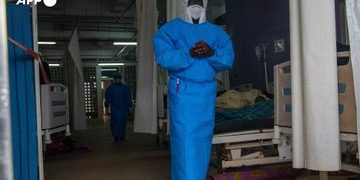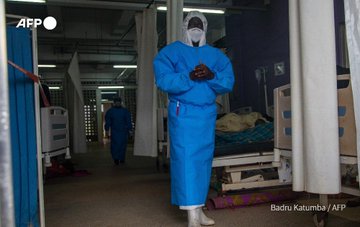President Museveni has warned traditional healers and religious leaders against accepting Ebola patients insisting that the sick should be handled by medical workers.
While addressing the nation on Wednesday, Museveni told the story of a 45-year-old man called Twagiira Yezu Ndahiiro aka Kakono who was a known contact under follow-up.
According to the ministry of Health, Twagiira escaped from his home in Kanseera Village, Kirwanyi Parish, Kiruuma Sub-county, Mubende District and travelled to Luweero District to seek treatment from a traditional healer.
Thereafter, he was taken to Kiruddu National Referral Hospital in Kampala at 5:00pm, on 6th October, 2022 and died at 3:00am on 7th October, 2022.
Twagiira was a previously listed contact to his brother, Nzairwa Cleophas, an 18-year-old, who died during a surgical procedure on 18th September, 2022, at Mubende Hospital.
“It is this Nzairwa Cleophas who exposed our 6 health workers to Ebola infection, 2 of whom died,” Museveni narrated.
On 23rd September, 2022, Twagiira was listed as a contact by Ministry of Health surveillance teams and was being followed up but he became elusive and disappeared from his residence.
It is reported that on 3rd October, 2022, his condition deteriorated and was taken by his family to a traditional healer in Luweero district.
Thereafter, on 6th October, 2022, with the help of his wife, Mutoni and his other brother, Taata Juya, who are residents of Busega and Nateete respectively, he was moved to Kiruddu Hospital for further management.
While in Kiruddu hospital, Twagiira gave wrong names and address to divert the health workers’ attention from associating him with the ongoing Ebola outbreak in Mubende.
The health workers at Kiruddu suspected him to have liver/kidney problems and peptic ulcers. Because of this, the health workers used protective wear while attending to him. He died 10 hours later.
The relatives requested for his body which they transported on top of a taxi to his village in Kanseera, Mubende District, the same morning.
The DISO, DPC and Village Chairman made efforts to intercept the commuter taxi that carried the body but failed to locate it. However, they were able to intervene to have a supervised burial conducted by the burial teams in Mubende.
A sample from the deceased was taken off by the burial team, tested the same day and returned positive for Ebola.
Twagiira and Nzairwa belong to an extended family living in three homesteads in Kyamuhingi cell in Kanseera village, Mubende District. They moved from DRC several years ago and settled in Mubende District.
He said this same family was also hiding a confirmed Ebola case called Katushabe Emmanuel, 49-year-old male who died on 10th October 2022, shortly before they were rounded off.
The village where this family stays has so far lost 10 people to Ebola.
Measures
He directed that the family cooperates with the district officials and health workers and stops moving around seeking treatment from witch doctors.
He said health workers must use appropriate protective wear (gloves, aprons, masks) whenever they are examining patients.
“The witch doctors, traditional healers and herbalists should not accept sick people in your shrines or places of treatment. Advise them to call health workers for safe transfer to hospitals,” he stated, adding:
“Religious leaders should not accept sick people with symptoms of Ebola who come seeking for healing prayers because when you touch them, you will contract Ebola. Advise them to call health workers for safe transfer to hospitals.”
Museveni also warned Boda boda riders to be vigilant and not carry sick people with signs and symptoms of Ebola.
“The Security supporting the response teams in the districts must be very vigilant and ensure no Ebola patients in treatment centers or contacts in the quarantine facility escape. In addition, they should dress up in protective wear and arrest contacts who refuse to be taken to isolation.”
Vaccine
On Wednesday, World Health Organization chief, Tedros Adhanom Ghebreyesus, told a meeting from Geneva that clinical trials could start within weeks on drugs to combat the particular strain circulating in Uganda known as the Sudan ebola virus, for which there is currently no vaccine.
Two vaccines are being developed to treat the Ebola-Sudan strain in Uganda, the agency said.
Shots that helped curb a recent outbreak in the Democratic Republic of Congo are ineffective against this version.
Dr Yonas Tegegn Woldemariam, the WHO country representative, asked Uganda to focus on community mobilisation and prevention of Ebola, warning that waiting for the vaccine could slow down the fight to end the epidemic.
“Let us focus on the community response. These [candidate vaccines for Ebola Sudan] are studies, they are not the solution,” Dr Yonas Tegegn Woldemariam, is quoted as saying.
According to Dr Henry Mwebesa, the director general of Health Services at the Health ministry, discussions are ongoing on whether an approved vaccine for the Ebola Zaire strain can be used.
“The scientists are still discussing and they will guide us on what to do,” he is quoted as saying.









